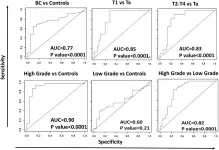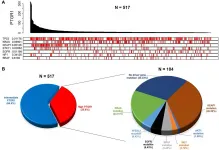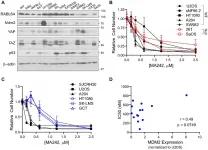(Press-News.org) Oncotarget published "Urine protein biomarkers of bladder cancer arising from 16-plex antibody-based screens" which reported that the current study examines urine samples from 66 subjects, comprising of 31 Urology clinic controls and 35 bladder cancer patients, using a Luminex based screening platform.
ELISA validation was carried out for the top 4 prospective urine biomarkers using an independent cohort of 20 Urology clinic controls and 60 bladder cancer subjects.
Eight of these urine proteins were able to differentiate BC from control urine with ROC AUC values exceeding 0.70 at p < 0.0001, with specificity values exceeding 0.9. Upon ELISA validation, urine IL-1α, IL-1ra, and IL-8 were able to distinguish control urine from urine drawn from various bladder cancer stages, with IL-8 being the best discriminator.
These Oncotarget findings suggest that urine IL-1α, IL-1ra and IL-8 are useful indicators of bladder cancer.
These Oncotarget findings suggest that urine IL-1α, IL-1ra and IL-8 are useful indicators of bladder cancer.
Urine IL-8 not only distinguishes bladder cancer from controls, it also discriminates high grade from low grade disease, and the successive clinical stages of bladder cancer.
Dr. Chandra Mohan from The University of Houston said, "Bladder cancer (BC) is the sixth most common cancer diagnosis in the United States and is over four times more common in men than women."
Urine biomarkers could potentially provide preliminary confirmation of low-grade BC before invasive procedures are performed and facilitate surveillance of BC, as reviewed.
The present study implements a Luminex based screening platform with a cytokine/chemokine panel that simultaneously interrogates 16 urine biomarkers, followed by ELISA validation of 4 prospective urine biomarkers.
Of the 16 proteins screened by Luminex, 12 were within the detectable range and among these, 10 urine biomarkers showed significant elevation in BC compared to the controls.
ELISA validation for these 4 urine biomarkers was carried out using an independent cohort of 20 urology clinic controls and 60 BC subjects.
Of these 4 proteins, IL-8 displayed the highest significance in discriminating between controls and BC patients and discriminating highly advanced stages/grades of BC from less advanced stages/grades of BC.
The Mohan Research Team concluded in their Oncotarget Research Output that these studies indicate that urine IL-1α, IL-1ra, and IL-8 are potential biomarkers of BC, two of which re-affirm previous reports.
These studies shed additional light on the potential utility of these markers, since some of them also exhibit the ability to discriminate T1 and/or T2-T4 from Ta BC, as well as high grade from low grade BC.
Looking forward, systematic studies in larger patient cohorts are warranted to establish the specific clinical contexts in which these markers may be used, including the following: for initial diagnosis of BC, for surveillance of tumor recurrence, and/or for assessing treatment response following BCG therapy or other therapeutic modalities.
Finally, these newer urine biomarkers need to be compared against the performance of current yardsticks such as the Bladderchek and UroVysion FISH assay.
Sign up for free Altmetric alerts about this article
DOI - https://doi.org/10.18632/oncotarget.27941
Full text - https://www.oncotarget.com/article/27941/text/
Correspondence to - Chandra Mohan - cmohan@central.uh.edu
Keywords -
urothelial,
proteomics,
targeted screens,
interleukins,
inflammation
About Oncotarget
Oncotarget is a bi-weekly, peer-reviewed, open access biomedical journal covering research on all aspects of oncology.
To learn more about Oncotarget, please visit https://www.oncotarget.com or connect with:
SoundCloud - https://soundcloud.com/oncotarget
Facebook - https://www.facebook.com/Oncotarget/
Twitter - https://twitter.com/oncotarget
LinkedIn - https://www.linkedin.com/company/oncotarget
Pinterest - https://www.pinterest.com/oncotarget/
Reddit - https://www.reddit.com/user/Oncotarget/
Oncotarget is published by Impact Journals, LLC please visit https://www.ImpactJournals.com or connect with @ImpactJrnls
Oncotarget published "The acylfulvene alkylating agent, LP-184, retains nanomolar potency in non-small cell lung cancer carrying otherwise therapy-refractory mutations" which reported that KEAP1 mutant NSCLCs further activate NRF2 and upregulate its client PTGR1. LP-184, a novel alkylating agent belonging to the acylfulvene class is a prodrug dependent upon PTGR1.
The authors hypothesized that NSCLC with KEAP1 mutations would continue to remain sensitive to LP-184. LP-184 demonstrated highly potent anticancer activity both in primary NSCLC cell lines and in those originating from brain metastases of primary lung cancers.
LP-184 activity correlated with PTGR1 transcript levels but was independent of mutations in key oncogenes and tumor ...
Oncotarget published "Prognostic and therapeutic value of the Hippo pathway, RABL6A, and p53-MDM2 axes in sarcomas" which reported that herein the authors evaluate expression of TAZ and YAP, the p53-MDM2 axis, and RABL6A, a novel oncoprotein with potential ties to both pathways, in sarcomas of different histological types.
Immunohistochemical staining of a tissue microarray including 163 sarcomas and correlation with clinical data showed that elevated YAP and TAZ independently predict worse overall and progression-free survival, respectively.
In the absence of p53 expression, combined TAZ and YAP expression adversely affect overall, progression free, and metastasis free survival ...
Regular consumption of milk is not associated with increased levels of cholesterol, according to new research.
A study published in the International Journal of Obesity looked at three large population studies and found that people who regularly drank high amounts of milk had lower levels of both good and bad cholesterol, although their BMI levels were higher than non-milk drinkers. Further analysis of other large studies also suggests that those who regularly consumed milk had a 14% lower risk of coronary heart disease.
The team of researchers took a genetic approach to milk consumption by looking at a variation in the lactase gene associated with digestion of milk sugars known as lactose.
The study identified that having the genetic variation where people can digest ...
Press release - Abstract 1394: Alterations in clock genes expression in Eutopic and Ectopic Endometrial Tissue
New research suggests that night shift work is linked to menstrual irregularity and increased chance of developing endometriosis
According to a study being presented at the 23rd European Congress of Endocrinology (e-ECE 2021), on Sunday 23 May at 19:00 CET (http://www.ece2021.org), women working night shifts may be at a greater risk of menstrual irregularity and developing endometriosis. The research found a reduction in the expression of PER-2, CRY-1 and CLOCK genes along with an increase in REV-ERBb in ectopic compared to ...
Bethesda, MD (May 23, 2021) -- Patients' irritable bowel syndrome (IBS) symptoms unexpectedly improved when they were under COVID-19 stay-at-home orders, reaffirming the gut-brain connection in functional gastrointestinal disorders, according to research that was selected for presentation at Digestive Disease Week® (DDW) 2021.
"One of our main hypotheses was that these patients were going to be worse because of pressure and stress due to COVID-19," said Juan Pablo Stefanolo, MD, a lead author on the study and a physician with the Neurogastroenterology and Motility section, Hospital de Clínicas José de San Martín, ...
Bethesda, MD (May 22, 2021) -- An artificial intelligence tool under development at Duke University can be added to the standard toilet to help analyze patients' stool and give gastroenterologists the information they need to provide appropriate treatment, according to research that was selected for presentation at Digestive Disease Week® (DDW) 2021. The new technology could assist in managing chronic gastrointestinal issues such as inflammatory bowel disease (IBD) and irritable bowel syndrome (IBS).
"Typically, gastroenterologists have to rely on patient self-reported information about their stool to help determine the cause of their ...
Tokyo, Japan - Researchers from Tokyo Metropolitan University have been quantifying how different batches of mesenchymal stem cells respond to the mechanical stiffness of their environments. They focused on how certain proteins were "localized" in cell nuclei and found key trends in how this changed with stiffness. Their findings explain inconsistencies between previous findings and may guide how scientists control the state of stem cells for research and medical treatments.
Mesenchymal stem cells (MSCs) are important "progenitor" cells that can transform into muscle, cartilage, bone or fat cells. In 2006, pioneering work by Engler and coworkers showed that they could control what cell type mesenchymal stem cells ...
Nearly half a billion people on the planet have diabetes, but most of them aren't getting the kind of care that could make their lives healthier, longer and more productive, according to a new global study of data from people with the condition.
Many don't even know they have the condition.
Only 1 in 10 people with diabetes in the 55 low- and middle-income countries studied receive the type of comprehensive care that's been proven to reduce diabetes-related problems, according to the new findings published in Lancet Healthy Longevity.
That comprehensive package of care ...
Business shutdowns reduce COVID-19 deaths, though with rapidly diminishing returns, with study of Italian lockdowns estimating they saved over 9,400 lives in under a month.
INFORMATION:
Article Title: Closed for business: The mortality impact of business closures during the Covid-19 pandemic
Funding: The author(s) received no specific funding for this work.
Competing Interests: The authors have declared that no competing interests exist.
Article URL: https://journals.plos.org/plosone/article?id=10.1371/journal.pone.0251373
...
Plant diseases don't stop at national borders and miles of oceans don't prevent their spread, either. That's why plant disease surveillance, improved detection systems, and global predictive disease modeling are necessary to mitigate future disease outbreaks and protect the global food supply, according to a team of researchers in a new commentary published in Proceedings of the National Academy of Sciences.
The idea is to "detect these plant disease outbreak sources early and stop the spread before it becomes a pandemic," says lead-author Jean Ristaino, William Neal Reynolds Distinguished Professor of Plant Pathology at North Carolina State University. Once an epidemic occurs it is difficult to control, Ristaino says, likening the effort to the one undertaken ...



